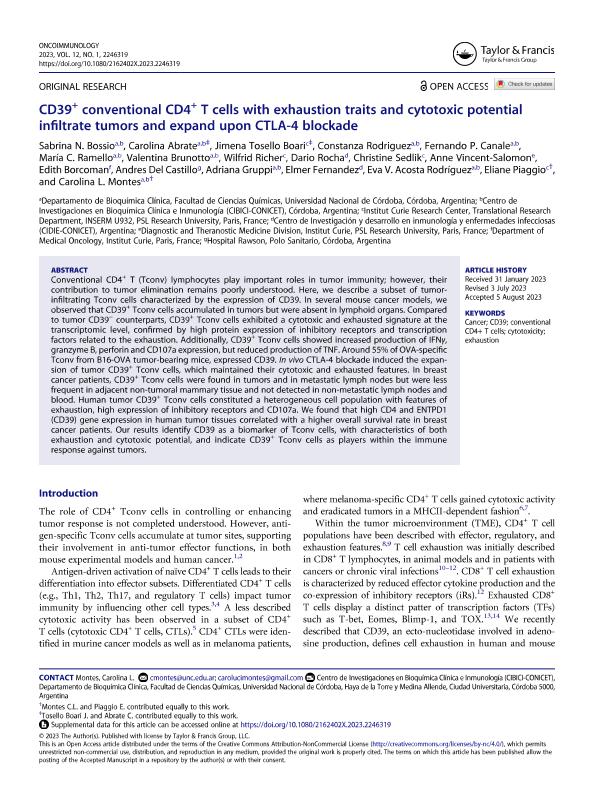Artículo
CD39+ conventional CD4+ T cells with exhaustion traits and cytotoxic potential infiltrate tumors and expand upon CTLA-4 blockade
Bossio, Sabrina Noemí ; Abrate, Carolina Paola
; Abrate, Carolina Paola ; Tosello Boari, Jimena
; Tosello Boari, Jimena ; Rodriguez, Constanza
; Rodriguez, Constanza ; Canale, Fernando Pablo
; Canale, Fernando Pablo ; Ramello, María Cecilia
; Ramello, María Cecilia ; Brunotto, Valentina
; Brunotto, Valentina ; Richer, Wilfrid; Rocha, Darío Gastón; Sedlik, Christine; Vincent Salomon, Anne; Borcoman, Edith; Del Castillo, Andres; Gruppi, Adriana
; Richer, Wilfrid; Rocha, Darío Gastón; Sedlik, Christine; Vincent Salomon, Anne; Borcoman, Edith; Del Castillo, Andres; Gruppi, Adriana ; Fernandez, Elmer Andres
; Fernandez, Elmer Andres ; Acosta Rodriguez, Eva Virginia
; Acosta Rodriguez, Eva Virginia ; Piaggio, Eliane; Montes, Carolina Lucia
; Piaggio, Eliane; Montes, Carolina Lucia
 ; Abrate, Carolina Paola
; Abrate, Carolina Paola ; Tosello Boari, Jimena
; Tosello Boari, Jimena ; Rodriguez, Constanza
; Rodriguez, Constanza ; Canale, Fernando Pablo
; Canale, Fernando Pablo ; Ramello, María Cecilia
; Ramello, María Cecilia ; Brunotto, Valentina
; Brunotto, Valentina ; Richer, Wilfrid; Rocha, Darío Gastón; Sedlik, Christine; Vincent Salomon, Anne; Borcoman, Edith; Del Castillo, Andres; Gruppi, Adriana
; Richer, Wilfrid; Rocha, Darío Gastón; Sedlik, Christine; Vincent Salomon, Anne; Borcoman, Edith; Del Castillo, Andres; Gruppi, Adriana ; Fernandez, Elmer Andres
; Fernandez, Elmer Andres ; Acosta Rodriguez, Eva Virginia
; Acosta Rodriguez, Eva Virginia ; Piaggio, Eliane; Montes, Carolina Lucia
; Piaggio, Eliane; Montes, Carolina Lucia
Fecha de publicación:
08/2023
Editorial:
Taylor & Francis
Revista:
OncoImmunology
ISSN:
2162-4011
Idioma:
Inglés
Tipo de recurso:
Artículo publicado
Clasificación temática:
Resumen
Conventional CD4+ T (Tconv) lymphocytes play important roles in tumor immunity; however, their contribution to tumor elimination remains poorly understood. Here, we describe a subset of tumor-infiltrating Tconv cells characterized by the expression of CD39. In several mouse cancer models, we observed that CD39+ Tconv cells accumulated in tumors but were absent in lymphoid organs. Compared to tumor CD39− counterparts, CD39+ Tconv cells exhibited a cytotoxic and exhausted signature at the transcriptomic level, confirmed by high protein expression of inhibitory receptors and transcription factors related to the exhaustion. Additionally, CD39+ Tconv cells showed increased production of IFN (Formula presented.), granzyme B, perforin and CD107a expression, but reduced production of TNF. Around 55% of OVA-specific Tconv from B16-OVA tumor-bearing mice, expressed CD39. In vivo CTLA-4 blockade induced the expansion of tumor CD39+ Tconv cells, which maintained their cytotoxic and exhausted features. In breast cancer patients, CD39+ Tconv cells were found in tumors and in metastatic lymph nodes but were less frequent in adjacent non-tumoral mammary tissue and not detected in non-metastatic lymph nodes and blood. Human tumor CD39+ Tconv cells constituted a heterogeneous cell population with features of exhaustion, high expression of inhibitory receptors and CD107a. We found that high CD4 and ENTPD1 (CD39) gene expression in human tumor tissues correlated with a higher overall survival rate in breast cancer patients. Our results identify CD39 as a biomarker of Tconv cells, with characteristics of both exhaustion and cytotoxic potential, and indicate CD39+ Tconv cells as players within the immune response against tumors.
Palabras clave:
CANCER
,
CD39
,
CONVENTIONAL CD4+ T CELLS
,
CYTOTOXICITY
,
EXHAUSTION
Archivos asociados
Licencia
Identificadores
Colecciones
Articulos(CIBICI)
Articulos de CENTRO DE INV.EN BIOQUI.CLINICA E INMUNOLOGIA
Articulos de CENTRO DE INV.EN BIOQUI.CLINICA E INMUNOLOGIA
Articulos(CIDIE)
Articulos de CENTRO DE INV. Y DESARROLLO EN INMUNOLOGIA Y ENFERMEDADES INFECCIOSAS
Articulos de CENTRO DE INV. Y DESARROLLO EN INMUNOLOGIA Y ENFERMEDADES INFECCIOSAS
Citación
Bossio, Sabrina Noemí; Abrate, Carolina Paola; Tosello Boari, Jimena; Rodriguez, Constanza; Canale, Fernando Pablo; et al.; CD39+ conventional CD4+ T cells with exhaustion traits and cytotoxic potential infiltrate tumors and expand upon CTLA-4 blockade; Taylor & Francis; OncoImmunology; 12; 1; 8-2023; 1-16
Compartir
Altmétricas



